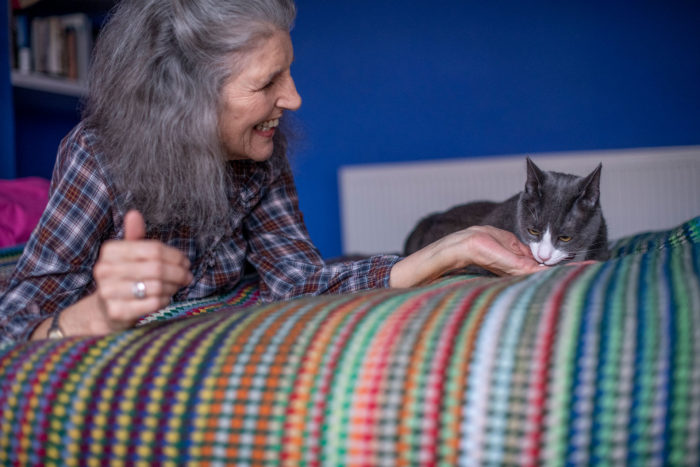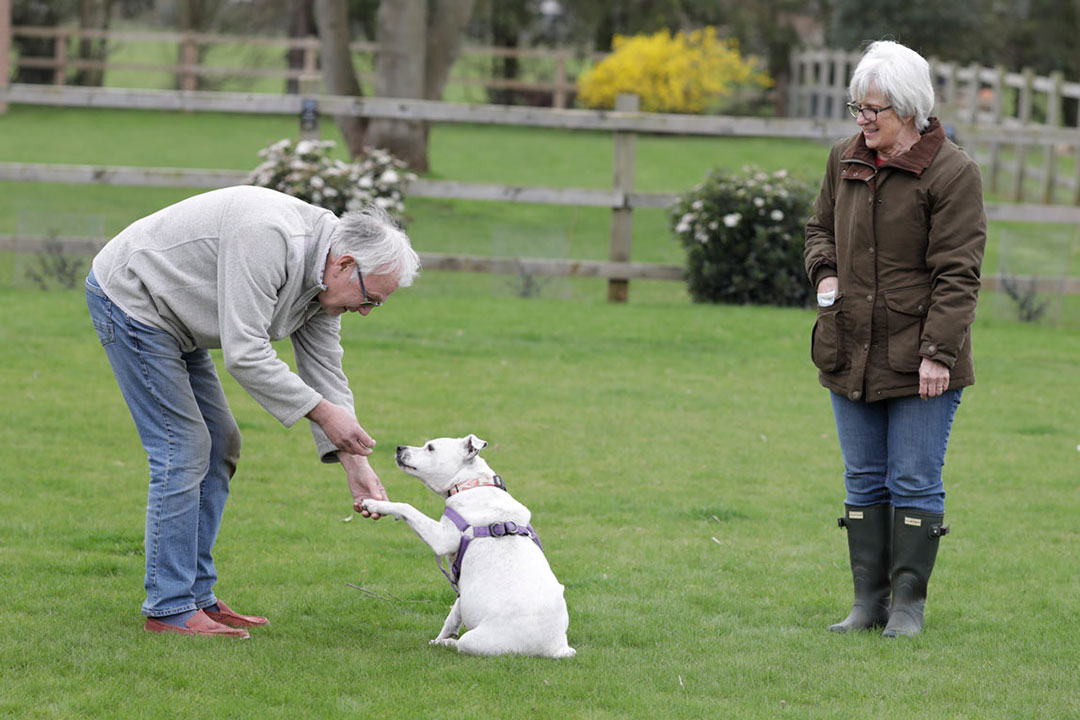Experienced Companion Seekers
This audience represent experienced dog and cat owners who are going through big changes in their lives, with children leaving home, retirement and an increase in health issues.
Their pets provide valued companionship structure and purpose to support them through these changes. Because of the increasingly important role they play, they see themselves as having a very close relationship with their pets and have the time and resources to adapt their lifestyles to their pets needs, going the extra mile to ensure their pets have everything they need to stay healthy and happy.
They take an interest in pet related content in the media so have a high awareness of animal welfare issues, because of this they have a high pre-disposal to rescue a dog, being less driven by a desire for a specific breed or a puppy and are the most likely to support animal welfare organisations with regular financial donations.

Whilst this audience are not digital natives, they will use the internet as a starting point for gathering information, consuming news and carrying out admin related tasks, And throughout the pandemic became increasingly comfortable using online methods such as video calls, email, WhatsApp and Facebook to stay in touch with family and friends.
They predominantly rely on their previous experience to guide them in how to look after their pets if they face a particular issue they are unsure about whether health or behavioural, they would prefer to talk to a trusted professional directly to get advice.
Their pets provide an important sense of community, bringing them in touch with fellow pet owners and providing shared interest and connection. They are interested in ways to expand this sense of community and share their experiences and knowledge to help improve the welfare of pets.
55-70
core age range
55%
female
75%
married
£35-£75k
average household income
70%
own house outright
Retired, or working part-time in a mid management role. They tend to live in small towns and rural areas.

65%
own one or more dogs
35%
own one or more cats
5%
own multiple pets
Where their pet is from
Pet insurance in place
Registered with vet
Average time spent with their pet per day
Dogs: 4 hours
Cats: 3 hours

Medium risk
This group are committed pet owners so will avoid relinquishing their pets where possible, but age related circumstances or issues with existing pets can arise.
Key reasons
- Their ill health or someone in the household.
- A pet not getting along with another animal in the household.

This audience are the most likely to rescue a pet with complex behavioural needs and can struggle to find expert advice to support with this.
They will often already have a pet in their household and introducing a new pet means issues can arise.
They value having a trusted relationship with a local vet that they can turn to for advice and have found this has become more difficult to establish in recent years.
This group is most likely to report experiencing obesity issues with their pet. With a higher number of older pets they are dealing with a multitude of health issues and pet mortality.
Their own health issues can prevent them from giving their pets the care and attention they would like to.

- They are experienced pet owners and will make significant lifestyle changes to accommodate their pets behavioural needs, therefore less likely to source advice related to this.
- Sharing advice and information with their pet owning community usually face to face as opposed to online.
- They are the most significant viewers of pet related TV shows and this is a source of useful information.
- As they have been around pets for sometime some of their knowledge may be outdated, they are open to learning about things that will improve how they care for their pets, but won’t seek this proactively.
Health specific
- They will use online search to google symptoms, but only alongside reaching out to a professional that they can share their concerns with.
- They are interested in preventative health measures and will engage with companies and products that offer this such as supplements and specialist foods.
This audience is most likely to have come across Woodgreen through traditional marketing channels and watching The Doghouse.
% of your pet rehomer applications this audience make up
% of your current supporter base this audience makes up

This audience are charitable by nature and more likely to support an animal welfare charity then any other type of cause.
They see supporting charities as part of their duty and donating to charity on a regular basis is habitual. They will tend to give to multiple charities and choose those where they feel their support can make the most impact, so have a preference for smaller and ‘local’ charities.
60% have supported an animal welfare charity in some way.
Top animal charities supported: Cats Protection, Battersea and The Donkey Sanctuary.
- Terrestrial TV channels
- Facebook , animal welfare followers
- National newspapers
- Direct Mail
- Charity Shops
- Local pet shops
- Community outreach
- Animal welfare issues.
- Case studies leading to financial asks.
- Community building pieces and forums.
- Tailored and specific advice and support.
- Emotional storytelling.
- Facebook – multi-image, static imagery, video polls.
- Regular giving
- Cash gifts
- Fundraising groups and associations
- Gift products
- Lottery and raffles

Meet Jane
65 year old, rescue dog owner
Download Jane's portrait
Meet Barbara
55 year old, cat owner
Download Barbara's portrait
Engage them through emotional storytelling
They enjoy long form content and will engage with in-depth stories about the pets that Woodgreen support. Take them behind the scenes so they can feel their support is going to something tangible. Make links with the Dog House.
Utilise engagement comms to provide tips and advice
Whilst this audience won’t proactively seek animal welfare advice unless there is a serious issue, their love for their pets means they will appreciates being served with useful information that they may not be aware of.
Expand your gift range
They enjoy buying gifts for their pets and unique pet related gifts for their friends.
Support them through the loss of a pet
Provide opportunities for bereaved pet owners to connect with other bereaved pet owners, channels for them to express their grief and celebrate the lives of their beloved pets.
Give them opportunities to talk about their pets
This audience love sharing stories and information about their pets. Seek ways to provide avenues for this and capture this information to engage with them in future communications.
- Warm
- Practical
- Empathetic











